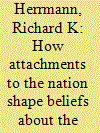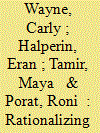|
|
|
Sort Order |
|
|
|
Items / Page
|
|
|
|
|
|
|
| Srl | Item |
| 1 |
ID:
153556


|
|
|
|
|
| Summary/Abstract |
If competing beliefs about political events in the world stem largely from information asymmetries, then more information and knowledge should reduce the gap in competing perceptions. Empirical studies of decision making, however, often find just the reverse: as knowledge and the stakes in play go up, the beliefs about what is happening polarize rather than converge. The theory proposed here attributes this to motivated reasoning. Emotions inside the observer shape beliefs along with information coming from the outside world. A series of experiments embedded in a national survey of Americans finds that a primary driver of the beliefs someone forms about globalization, other countries, and the politics in the Middle East is how strongly they attach their social identity to the United States. Attachment produces more intense positive and negative emotions that in turn shape the interpretation of unfolding events and lead norms to be applied in an inconsistent fashion. People, in effect, rewrite reality around their favored course of action, marrying the logic of appropriateness to their own preferences. Beliefs, consequently, are not independent of preferences but related to them. Motivated reasoning, while not consistent with rational models, is predictable and can lead to expensive mistakes and double standards that undermine liberal internationalism.
|
|
|
|
|
|
|
|
|
|
|
|
|
|
|
|
| 2 |
ID:
117580


|
|
|
|
|
| Publication |
2012.
|
| Summary/Abstract |
Recent polls reveal that between 20% and 25% of Americans erroneously indicate that President Obama is a Muslim. In this article, we compare individuals' explicit responses on a survey about religion and politics with reaction time data from an Implicit Association Test (IAT) to investigate whether individuals truly associate Obama with Islam or are motivated reasoners who simply express negativity about the president when given the opportunity. Our results suggest that predispositions such as ideology, partisanship, and race affect how citizens feel about Obama, which in turn motivates them to accept misinformation about the president. We also find that these implicit associations increase the probability of stating that Obama is likely a Muslim. Interestingly, political sophistication does not appear to inoculate citizens from exposure to misinformation, as they exhibit the same IAT effect as less knowledgeable individuals.
|
|
|
|
|
|
|
|
|
|
|
|
|
|
|
|
| 3 |
ID:
171167


|
|
|
|
|
| Summary/Abstract |
Canonical models of costly signaling in international relations (IR) tend to assume costly signals speak for themselves: a signal's costliness is typically understood to be a function of the signal, not the perceptions of the recipient. Integrating the study of signaling in IR with research on motivated skepticism and asymmetric updating from political psychology, we show that individuals’ tendencies to embrace information consistent with their overarching belief systems (and dismiss information inconsistent with it) has important implications for how signals are interpreted. We test our theory in the context of the 2015 Joint Comprehensive Plan of Action (JCPOA) on Iran, combining two survey experiments fielded on members of the American mass public. We find patterns consistent with motivated skepticism: the individuals most likely to update their beliefs are those who need reassurance the least, such that costly signals cause polarization rather than convergence. Successful signaling therefore requires knowing something about the orientations of the signal's recipient.
|
|
|
|
|
|
|
|
|
|
|
|
|
|
|
|
| 4 |
ID:
149477


|
|
|
|
|
| Summary/Abstract |
How does accountability impact political decisions? Though previous research on accountability has demonstrated its potential effects in the realms of business, elections, and more, very little research has explored the effect of citizen accountability in highly ideological, intractable, and political conflicts. This article addresses this issue, looking at the unique interaction between accountability and ideology on Israeli citizens’ political attitudes regarding the Israeli–Palestinian conflict. The results of two experimental studies in Israel reveal that accountable individuals behave in significantly more ideologically partisan ways than their nonaccountable counterparts. Moreover, this polarization is dependent on the specific conflict context, with leftists more affected by the issue of negotiations and rightists by security concerns. This signals that ideological polarization under accountability may depend on the “issue ownership” each ideological group feels toward the specific conflict context and its corresponding social goal of projecting ideological consistency on these issues.
|
|
|
|
|
|
|
|
|
|
|
|
|
|
|
|
|
|
|
|
|